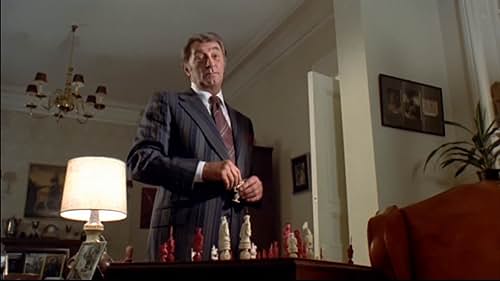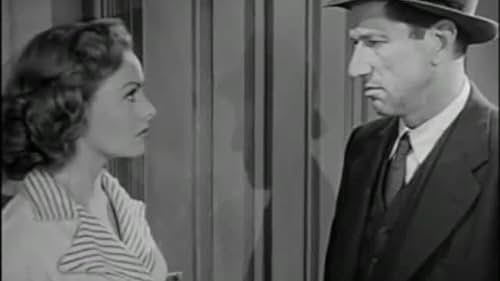Richard Boone(1917-1981)
- Actor
- Director
- Producer
Richard Allen Boone was born in Los Angeles, California, to Cecile Lillian (Beckerman) and Kirk Etna Boone, a wealthy corporate lawyer. His maternal grandparents were Russian Jewish immigrants, while his father was descended from a brother of frontiersmen Daniel Boone and Squire Boone.
Richard was a college student, boxer, painter and oil-field laborer before ending up in the U.S. Navy during World War II. After the war he used the G.I. Bill to study acting with the Actor's Studio in New York. Serious and methodical, Boone debuted on Broadway in the play "Medea". Other plays followed, as did occasional TV work. In 1950 20th Century-Fox signed him to a contract and he made his screen debut in Halls of Montezuma (1951), playing a Marine Corps officer. Tall and craggy, Boone was continually cast in a number of war and western movies. He also tackled roles such as Pontius Pilate in The Robe (1953) and a police detective in Vicki (1953). In 1954 he was cast as Dr. Konrad Styner in the pioneering medical series Medic (1954), which was a critical but not a ratings success. This role lasted for two years, though in the meantime, he continued to appear in westerns and war movies.
In 1957 he played Dr. Wright, who treats Elizabeth for her memory lapses, in Lizzie (1957). It was also in that year that Boone was cast in what is his best-known role, the cultured gunfighter Paladin in the highly regarded western series Have Gun - Will Travel (1957). Although a gun for hire, Paladin was usually a moral one, did the job and lived at the Hotel Carlton in San Francisco. Immensely popular, the show made Boone a star. The series lasted six years, and in addition to starring in it, Boone also directed some episodes. He still kept busy on the big screen during the series' run, appearing as Sam Houston in the John Wayne epic The Alamo (1960), and as a weary cavalry captain fighting Indians in A Thunder of Drums (1961). After Have Gun - Will Travel (1957) ended in 1963, Boone hosted a dramatic anthology series, The Richard Boone Show (1963), but it was not successful.
Boone moved to Hawaii for the next seven years. During this time he made a few Westerns, including the muscular Rio Conchos (1964), but he was largely absent from the screen. In the 1970s he moved to Florida, and resumed his film and TV career with a vengeance. In 1972 he again appeared on television in the Jack Webb-produced series Hec Ramsey (1972) (years before he had played a police captain in Webb's first "Dragnet" film, Dragnet (1954)). Based on a real man, Hec was a tough, grizzled old frontier sheriff at the turn of the 20th century who, late in life, has studied the newest scientific theories of crime detection. His new boss, a much younger man, doesn't always approve of Hec, his nonconformist style or his new methods. The series lasted for two years. Boone continued working until the end of the decade but died as a result of throat cancer in 1981.
Richard was a college student, boxer, painter and oil-field laborer before ending up in the U.S. Navy during World War II. After the war he used the G.I. Bill to study acting with the Actor's Studio in New York. Serious and methodical, Boone debuted on Broadway in the play "Medea". Other plays followed, as did occasional TV work. In 1950 20th Century-Fox signed him to a contract and he made his screen debut in Halls of Montezuma (1951), playing a Marine Corps officer. Tall and craggy, Boone was continually cast in a number of war and western movies. He also tackled roles such as Pontius Pilate in The Robe (1953) and a police detective in Vicki (1953). In 1954 he was cast as Dr. Konrad Styner in the pioneering medical series Medic (1954), which was a critical but not a ratings success. This role lasted for two years, though in the meantime, he continued to appear in westerns and war movies.
In 1957 he played Dr. Wright, who treats Elizabeth for her memory lapses, in Lizzie (1957). It was also in that year that Boone was cast in what is his best-known role, the cultured gunfighter Paladin in the highly regarded western series Have Gun - Will Travel (1957). Although a gun for hire, Paladin was usually a moral one, did the job and lived at the Hotel Carlton in San Francisco. Immensely popular, the show made Boone a star. The series lasted six years, and in addition to starring in it, Boone also directed some episodes. He still kept busy on the big screen during the series' run, appearing as Sam Houston in the John Wayne epic The Alamo (1960), and as a weary cavalry captain fighting Indians in A Thunder of Drums (1961). After Have Gun - Will Travel (1957) ended in 1963, Boone hosted a dramatic anthology series, The Richard Boone Show (1963), but it was not successful.
Boone moved to Hawaii for the next seven years. During this time he made a few Westerns, including the muscular Rio Conchos (1964), but he was largely absent from the screen. In the 1970s he moved to Florida, and resumed his film and TV career with a vengeance. In 1972 he again appeared on television in the Jack Webb-produced series Hec Ramsey (1972) (years before he had played a police captain in Webb's first "Dragnet" film, Dragnet (1954)). Based on a real man, Hec was a tough, grizzled old frontier sheriff at the turn of the 20th century who, late in life, has studied the newest scientific theories of crime detection. His new boss, a much younger man, doesn't always approve of Hec, his nonconformist style or his new methods. The series lasted for two years. Boone continued working until the end of the decade but died as a result of throat cancer in 1981.




































